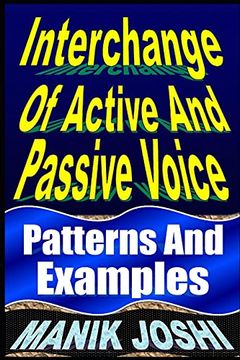Compartir
Interchange of Active and Passive Voice: Patterns and Examples: 12 (English Daily Use) (en Inglés)
Mr. Manik Joshi (Autor)
·
Createspace
· Tapa Blanda
Interchange of Active and Passive Voice: Patterns and Examples: 12 (English Daily Use) (en Inglés) - Mr. Manik Joshi
$ 5.52
$ 6.99
Ahorras: $ 1.47
Elige la lista en la que quieres agregar tu producto o crea una nueva lista
✓ Producto agregado correctamente a la lista de deseos.
Ir a Mis ListasSe enviará desde nuestra bodega entre el
Lunes 29 de Abril y el
Martes 30 de Abril.
Lo recibirás en cualquier lugar de Estados Unidos entre 1 y 3 días hábiles luego del envío.
Reseña del libro "Interchange of Active and Passive Voice: Patterns and Examples: 12 (English Daily Use) (en Inglés)"
VOICE – Definition -- Voice refers to the form of a verb that shows whether the subject of a sentence performs the action or is affected by it. ACTIVE VOICE – Definition -- The form of a verb in which the subject is the person or thing that performs the action. Example: They finished the work. [subject -- “they”, verb -- “finished”, object -- “work”] In this sentence, the subject (they) acts on the object (work). Other Examples: The teacher praises him. She posted the letter. I buy new books. We will celebrate his birthday. PASSIVE VOICE – Definition -- The form of a verb in which the subject is affected by the action of the verb. Important Note -- The object of the active voice becomes the subject in the passive voice. Example: The work was finished by them. [subject -- “work”, passive verb -- “was finished”, object -- “them”] In this example, the subject (work) is not the doer; it is being acted upon by the doer ‘them’) Other Examples: He is praised by the teacher. The letter was posted by her. New books are bought by me. His birthday will be celebrated by us. WHEN TO USE PASSIVE VOICE -- (1). You should use passive voice when you do not know the active subject. (2). When you want to make the active object more important. (3). When the active subject is obvious. (4). When you want to emphasize the action of the sentence rather than the doer of the action. (5). Passive voice is frequently used to describe scientific or mechanical processes. (6). Passive voice is often used in news reports. (7). When active voice does not sound good. (8). When you want to make more polite or formal statements. (9). You can use passive voice to avoid responsibility. (10). You can also use passive voice for sentence variety in your writing. (11). You can also use passive voice when you want to avoid extra-long subjects. Changing Active Voice Into Passive Voice -- Rule 1: Move the object of the active voice into the position of the subject (front of the sentence) in the passive voice. And move the subject of the active voice into the position of the object in the passive voice. Rule 2: Passive voice needs a helping verb to express the action. Put the helping verb in the same tense as the original active sentence. The main verb of the active voice is always changed into past participle (third form of the verb) in different ways. Rule 3: Place the active sentence's subject into a phrase beginning with the preposition ‘by’. Rule 4: If the object in an active voice sentence is a pronoun (me, us, you, him, her, they, it), it changes in passive voice sentence as follows: me -- I; us -- we; you -- you; him -- he; her -- she; them -- they; it – it Rule 5: Subject- Verb Agreement -- Make the first verb agree with the new subject in passive voice. Rule 6: When there are two objects (direct object and indirect object), only one object is interchanged. The second object remains unchanged. Following Tenses Cannot Be Changed Into Passive Voice: 1. Present Perfect Continuous Tense 2. Past Perfect Continuous Tense 3. Future Continuous Tense 4. Future Perfect Continuous Tense
- 0% (0)
- 0% (0)
- 0% (0)
- 0% (0)
- 0% (0)
Respuesta:
Todos los libros de nuestro catálogo son Originales.
Respuesta:
El libro está escrito en Inglés.
Respuesta:
La encuadernación de esta edición es Tapa Blanda.
✓ Producto agregado correctamente al carro, Ir a Pagar.

